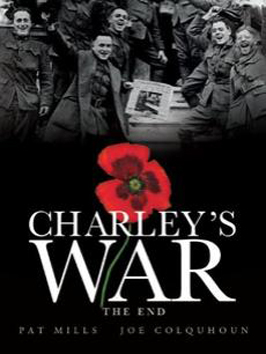Book Reviews: ‘Charley’s War’, & ‘Chomsky On Anarchism’
Realistic portrayal
Pat Mills and Joe Colquhoun, Charley’s War: Volumes 1 to 10, Titan Books
 Charley’s War has been described as the best British comic strip ever produced and it is difficult to disagree. It can be heartily recommended for younger people as an easy introduction to the First World War and for adults as a gripping read in itself.
Charley’s War has been described as the best British comic strip ever produced and it is difficult to disagree. It can be heartily recommended for younger people as an easy introduction to the First World War and for adults as a gripping read in itself.
The strip originally ran in Battlefrom 6 January 1979 to 26 January 1985 and follows the teenage Charley Bourne from his enlistment in early 1916, through the bloody battles at Somme and Passchendaele to the end of the war and beyond. It is a dramatic but realistic portrayal of life in the trenches, and through flashbacks and other devices deals with other less well known aspects of the war – the war in the air, at sea and on the home front, the experience of the French at Verdun, the Etaples Mutiny, and the intervention in Russia. It even features a conchy, though not a socialist – they were, alas, rare birds indeed.
Naturally various narrative devices of the genre are used in order to maintain attention and pace but the strip is never a standard boy’s own tale of daring do. Charley is treated as a real person, with a past, as a worker on the buses in London, a future, on the dole in the ‘30s, and a family life, father, mother and sister, and later a wife and children. It is easy to pick holes, e.g. its all too free adoption of the ’Lions led by Donkeys’ approach, which neglects the physical constraints of the fighting environment (could all the Generals on all the sides really have been such idiots?), and the occasional dubious historical details (although there were some horrific evil weapons in use, the acid sprayer used to melt soldiers depicted in the final book almost certainly never existed). However, the shock and power of the story lines overcome all niggling objections.
Charley’s War has been reproduced over a period of years by Titan in high quality hardback editions, which does the highly detailed art of Joe Colquhoun proud. The books have restrained but stylish black covers, which will not embarrass the non-genre purchaser. The reprints come complete with lots of finely crafted background information and excellent introductions. The full set is now available and is heartily recommended.
KAZ
************************************************************
Against the State (But Not Quite Yet)
Noam Chomsky: On Anarchism. Penguin £6.00
This is not a book with new material but a collection of articles and interviews published originally between 1969 and 2010. It is therefore not a place to look for an overview or consistent statement of Chomsky’s approach to anarchism. It is, however, interesting to see how close some of his political positions are to those of socialists.
For one thing, he rejects any idea that Bolshevism is ‘Marxism in practice’ and quotes approvingly Paul Mattick’s critical remarks on Leninism. Moreover, he says, a consistent anarchist must oppose private ownership of the means of production and the concomitant wage slavery, which he describes as ‘intolerable’. Capitalism is anti-human, and its unbridled version (one subject to less state regulation) would lead to extreme authoritarianism.
On the other hand, it is not clear if Chomsky’s conception of socialism is quite the same as ours. He is against the idea of providing a detailed plan of a future society, preferring to rely on general principles. He favours making changes piecemeal, since we cannot know the effects of large social changes; and if one change works out well, make further changes. But he does not explain how a major change to abolish the wages system could be carried out piecemeal.
And many anarchists will disagree with him when he advocates defending and strengthening some aspects of state authority. His stance is that only the (US) federal government can protect people from the tyranny of corporations. He gives the example of environmental regulations, but admits that these have only a limited effect.
The longest chapter here criticises the way the Spanish ‘Communist’ Party undermined anarchist-run areas in the Civil War. The volume as a whole has much worthwhile content, as long as you do not expect a fully-developed argument.
PB
